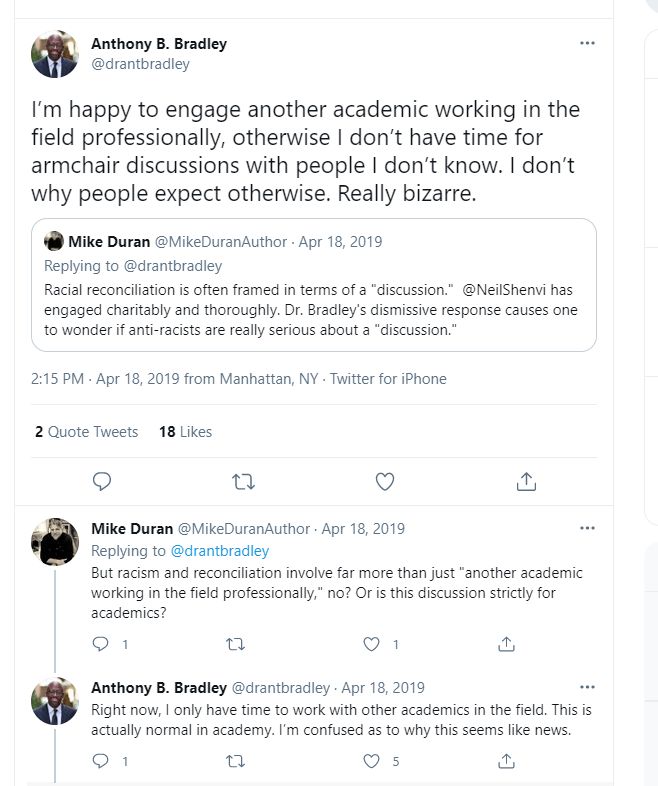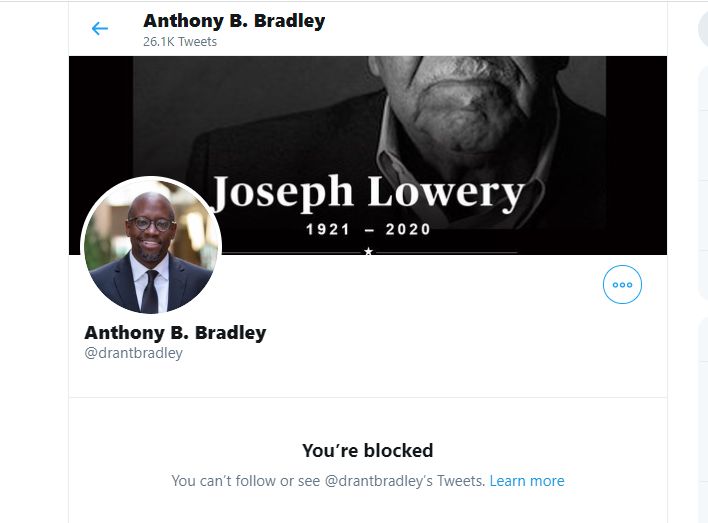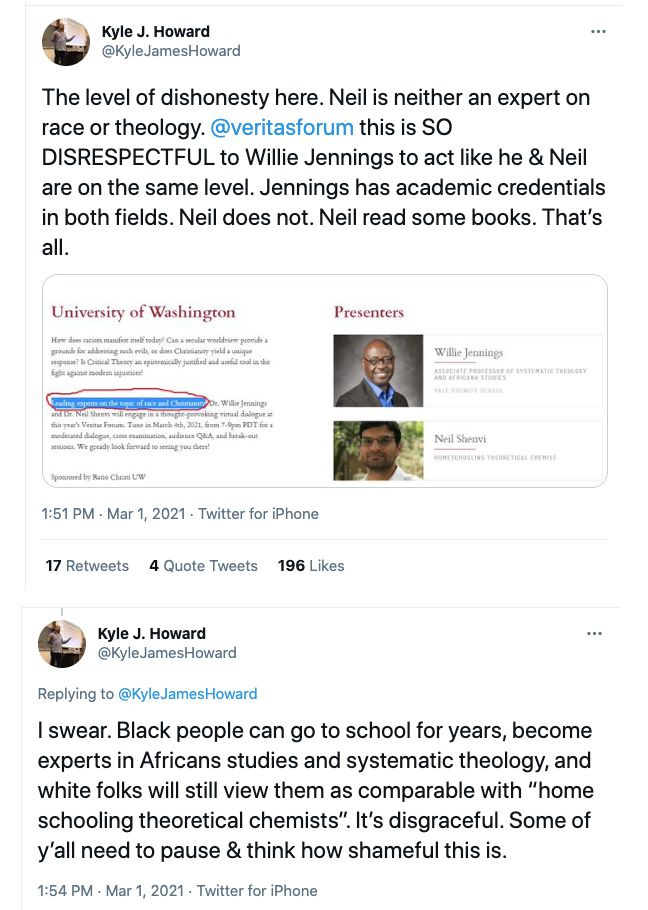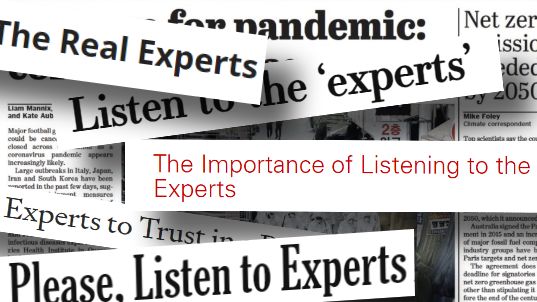How our failure to interrogate scientists, academics, researchers, and journalists is creating a class of (perceived) infallible elites.
In 2008, Silicon Valley entrepreneur and cultural critic, Andrew Keen, wrote The Cult of the Amateur, a scathing polemic against the detrimental effects of social media upon many cultural institutions. With the tools at our disposal, the average person could now amplify their opinions and engage audiences on a larger scale than ever before. But Keen noted how the democratization of the web often undermined the “experts,” empowering amateurs to bypass educational and professional checks and balances.
However, in the decade-plus years since the publication of Keen’s work, the pendulum may have swung too far in the opposite direction. Now, another cult has risen — the Cult of the Experts.
Perhaps nothing in recent memory has done more to expose this growing “cult” than the arrival of COVID-19.
The Coronavirus pandemic caused the entire globe to look to “the experts” — infectious disease experts, virology experts, respiratory experts, zoonotic disease experts, immunology experts, etc. The Federal government swung into action, as did state and local authorities, implementing sweeping quarantines and city-wide lockdowns. However, despite the chorus of expert voices, there remained a startling lack of consensus. In fact, many “experts” have since been proven very wrong.
Whether through political motivation or just poor data analysis, some experts predicted that between 1,000,000 and 10,000,000 COVID-19 deaths would occur in the United States before the end of 2020. (As of this writing, COVID deaths in the U.S. are under 600K.) While some states like New York and California went into full-scale lockdowns, states like Florida, South Dakota, and Texas did not. Ironically, all of them cited various “experts” that guided their decision-making. For example, though wearing face masks in public became mandatory in most areas and operations, it turned out “there is no clear scientific evidence that masks (surgical or cloth) work to mitigate risk to the wearer or to those coming into contact with the wearer.” While surface sanitization became routine to stopping the spread of the virus, it is now known that COVID-19 rarely spreads through surfaces. In 2020, the suggestion that COVID-19 may have been created in and/or escaped from a lab, was categorically framed as a “conspiracy theory” (see my article On Conspiracy Theories). In fact, those floating that claim were actively censored from social media platforms. However, there is now growing evidence that COVID-19 may have indeed originated in a lab. Despite the lockdown of schools and businesses, a German study recently found that the lockdown had little effect on virus infections. Even Dr. Anthony Fauci, often portrayed as THE expert on the Coronavirus, flip-flopped about ways to handle the pandemic. The recent release of his emails has even prompted some to issue calls for a criminal investigation into his mishandling of the event.
In retrospect, many are now admitting that the experts got it all wrong.
It’s lead some to ask, Will public trust in science survive the pandemic? and Can experts win back the public’s trust? Has COVID really marked the twilight of the expert class? Others suggest that the CDC has lost all credibility. Still others conclude, “Levels of trust in this country—in our institutions, in our politics, and in one another—are in precipitous decline.”
If anything, the pandemic has revealed an immense failure of leadership, proving our “experts” are all too fallible.
But while some experts may have taken a hit, the “expert class” still occupies a place of societal reverence. NY Times columnist David Brooks reminded us of this when he suggested that those living in rural parts of America often “feel threatened economically, culturally, socially” because “they have no contact with the expert class.” He added:
“…those of us in the expert class – journalism and academia – have to do a better job of reaching out in post-Trump, establishing relationships and showing some respect.”
It’s unclear who all occupies this “expert class.” But Brooks’ self-inclusion among “journalists and academics” gives us an idea who rubs shoulders in the intellectual penthouse.
“People these days may have had quite enough of experts… but the experts are still in power all the same.”
Even more interesting is the growing influence this “expert class” appears to be having in reshaping culture.
In his article, Why does our expert class fear democracy?, Salvatore Babones notes how 20th century democracies have drifted away from governance via elected officials towards an “increasing role of experts in public policy.” He writes,
“In the twentieth century, domain after domain of public life has slipped out of the realm of democratic governance and into the realm of expert oversight. Democracies are increasingly governed, not by the people, nor by their representatives, but by experts.”
Babones concludes, “People these days may have had quite enough of experts… but the experts are still in power all the same.”
One of the reasons that “the experts are still in power,” in spite of their recent (and repeated) failures, is the reluctance and/or refusal of the public (i.e, “non-elites”) to hold them accountable.
In his article Everybody’s an Expert, Louis Menand cites Philip Tetlock’s book, “Expert Political Judgment: How Good Is It? How Can We Know?” who explains
“…that people who make prediction their business—people who appear as experts on television, get quoted in newspaper articles, advise governments and businesses, and participate in punditry roundtables—are no better than the rest of us. When they’re wrong, they’re rarely held accountable, and they rarely admit it, either. They insist that they were just off on timing, or blindsided by an improbable event, or almost right, or wrong for the right reasons. They have the same repertoire of self-justifications that everyone has, and are no more inclined than anyone else to revise their beliefs about the way the world works, or ought to work, just because they made a mistake.”
Even though the “expert class” is comprised of people like you and me, they are, unlike you and me, “rarely held accountable.”
Apparently, we are still enamored of the credentialed. Which is one reason why appeals to education, accreditation, and expertise remain a default defense among the professional class. It is not uncommon to see a debate end with the citation of one’s academic pedigree:
- “I have a degree in Ethnic and Minority Studies.”
- “I’ve dedicated my life to studying Criminal Justice.”
- “I have a PhD in Applied Mathematics.”
- “I am a professor in Gender and Feminist Theory.”
- “I have a Master of Divinity and a B.A in Postcolonial Theology.”
Such pronouncements are often intended not simply as a profile descriptor, but as a conversation stopper.
Take a look at my brief exchange with Anthony Bradley, professor at King’s College in New York. He’d tweeted about not taking certain critics of Critical Race Theory (CRT) seriously. Among them was Neil Shenvi. Shenvi has provided some helpful, gracious, critiques of the emerging ideology. Bradley disagreed, saying “Neil’s stuff isn’t helpful at all & is blindly tribal. I’d never recommend it. ” And he made sure to add: “I have a PhD in this.” I commented that Bradley’s “dismissive” response to Shenvi made one wonder whether or not anti-racists are really serious about a discussion. To which this exchange followed.

So because I was not “another academic working in the field,” such conversations were merely “armchair discussions” which Bradley didn’t have time to engage in. He had the time to publicly post to over 39,000 followers, but not the time to engage one. Well, that was our only exchange. The next day I discovered that Dr. Bradley had blocked me.

Perhaps it’s understandable that a college professor shouldn’t waste time on Joe Schmo. However, such dismissals do not appear limited to us armchair critics.
Take for instance, Coleman Hughes and his ongoing critique of Ibram X. Kendi’s popular anti-racist teachings. Hughes — a fellow at the Manhattan Institute for Policy Research, graduate of Columbia University with a B.A. in philosophy, a writer, editor, and podcast host — extended an offer to publicly debate Kendi, with all proceeds going to the Negro College Fund. However, Kendi refuses to debate because, among other things, Hughes does not have a PhD. Hughes notes that this is “a wider problem among so-called anti-racist intellectuals” — they refuse to debate their critics.
Apparently, the ivory tower has not a few gatekeepers.
This seems especially true of the field of Critical Race Theory. When Veritas Forum scheduled a debate entitled “Race and Reconciliation” between Willie James Jennings, an associate professor of systematic theology and Africana studies at Yale Divinity School, and Neil Shenvi, an apologist with a Ph.D. in theoretical chemistry, the event was canceled after proponents of CRT complained that Shenvi was not “an expert on race or theology” while Jennings has the “academic credentials.”

Despite the fact that Shenvi has been on numerous panels, written extensively on the subject of CRT, and engaged in debates. the event was scrapped. As Rod Dreher correctly noted, the “arrogance and pride of academic credentialism” is not only unbecoming of Christian thinkers, but it prevents the public from engaging its very own thought leaders.
No wonder that this kind of critical deflection and refusal to entertain dissenters often creates an echo chamber among many in the elite class.
One tactic that cult leaders use to retain power is to insulate themselves against critique. “Touch not the Lord’s anointed!” proclaims the power-hungry televangelist. Likewise, the “expert class” attempts to preserve its power by stifling dissent and dismissing unqualified critics.
This approach is eerily similar to one that cult leaders use to retain power — they insulate themselves against critique. “Touch not the Lord’s anointed!” proclaims the power-hungry televangelist. Likewise, the “expert class” attempts to preserve its power by stifling dissent and dismissing unqualified critics.
In his Amazon review of a fellow academic’s book The Ahuman Manifesto: Activism for the End of the Anthropocene, this philosopher admits as much.
Every now and then a philosopher writes something so utterly absurd that — although ordinary people can easily recognize it as absurd indeed (ordinary folk have a knack for this that scholars haven’t yet learned) — it is nevertheless important that another philosopher stand up and be willing to do the very thing scholars most avoid doing: denounce another living scholar in the strongest of terms (this is always bad for job, promotion, tenure, and publication prospects, hence the avoidance). I have noticed that this filthy work has not yet been condemned publicly by other philosophers, which is why I (a philosopher and a philosophy professor myself) am writing this review. (bold, mine)
It’s refreshing to see an academic admit what we already guessed — criticizing one of their peers is bad for another academic’s career, promotion, and advancement.
The author of the book in question is Patricia MacCormack, a Professor of Continental Philosophy. She has written other similarly obtuse works. Her titles include: The Animal Catalyst: Towards Ahuman Theory, Ecosophical Aesthetics: Art, Ethics and Ecology with Guattari, and Posthuman Ethics: Embodiment and Cultural Theory. Timothy Dalrymple offers the following quote as an example of the nonsensical meanderings that characterize MacCormack’s “scholarly” work:
The multiplicity of becoming-cunt as an assemblage reassembles the tensors upon which it expresses force and by which force is expressed upon its various planes and dimensions.
Dalrymple cites this professor’s work not just as evidence that “cultural entropy is now inexorable,” but that it often starts with our intellectual elites. And when the experts are unwilling to push back against their peers it not only creates an echo chamber, but also a vacuum into which those less credentialed must enter. As the professor admits in his Amazon review, “ordinary people…. have a knack [for recognizing the absurd] that scholars haven’t yet learned.”
If “ordinary people” remain silent, if we don’t interrogate our “experts” and hold them accountable, we only perpetuate a dangerous tyranny.
If the king’s court refuses to speak the truth to their majesty, it behooves the peasants to revolt. Likewise, if “ordinary people” remain silent, if we don’t interrogate our “experts” and hold them accountable, we only perpetuate a dangerous tyranny. In fact, as Victor David Hansen noted in regards to COVID research, the political partisanship of the expert class — specifically, their hatred of Donald Trump — caused otherwise smart people to “suspend rules of…. logic,” with some of their professional opinions even leading to death.
…some of the most deductive and reductionist Trump haters were supposedly professionals, the highly educated, and the self-proclaimed devotees of the Enlightenment. And yet in their uncontrolled aversion and detestation, they suspended all the rules of empiricism, logic, and rationality—and people died as a result.
One would think that being part of David Brooks’ “expert class” would encourage unbiased, non-partisan research. Especially when human life is at stake! Sadly, this doesn’t appear the case.
In his essay Facts Don’t Care About Your Diversity Training Certificate—A Critique of Credentialism, Wilfred Reilly suggests that political partisanship is often an animating force among academic experts. Several studies of American university professors reveal that a significant number of academics openly identify as ideological Leftists. “24 percent of the social scientists surveyed described themselves as ‘radicals,’ 20.6 percent described themselves as ‘activists,’ and 17.6 percent described themselves as ‘Marxists.'” Furthermore, “of 3,937 faculty members who identified with a modern American political party, 3,623 were Democrats and only 314 were Republicans.”
Because of this, Wilfred M. McClay, himself an American academic, says that it is “an illusion” to think that the “experts” are free from peer pressure and groupthink. In his article, “What Do Experts Know?,” he writes:
“… it is an illusion to think that ‘experts’ are free of politics, groupthink, and other flaws. The noted economist Robert J. Shiller, who was an adviser to the Federal Reserve Bank of New York until 2004, recently admitted that he kept quiet about his growing misgivings over the housing bubble because he was afraid other economists would ostracize him. “
This “illusion” of ideological neutrality not only keeps “outsiders” from questioning the “expert class,” but it’s led to “political discrimination” within those circles. For example, Eric Kaufmann of the University of London published a remarkably detailed and comprehensive study of bias in academia. Entitled “Academic Freedom in Crisis: Punishment, Political Discrimination, and Self-Censorship,” Kaufmann summarizes:
“There is a climate of political discrimination inside the contemporary university… findings accumulated over a decade convincingly show that a majority of conservative academics experience a hostile environment for their beliefs…. This is a rational appraisal of the significant structural discrimination against them in the higher education sector.”
Apparently, the Cult of the Experts thrives on ideological homogeneity. Which makes one wonder whether the appeals to “academic credentialism” aren’t simply a means to barricade the academy against political interlopers.
So where does this leave the “average” lay person? We are told to “trust the experts,” to respect the office of the judge, scientist, doctor, or educator. But time and again, the experts have proven fallible.
“There is little evidence that a smart normal citizen, capable of effective analysis of empirical data, cannot criticize the work of academic or journalistic ‘experts’ in most fields—or any reason that he or she should be intimidated by these title-holders.”
Reilly offers some great advice here.
There is little evidence that a smart normal citizen, capable of effective analysis of empirical data, cannot criticize the work of academic or journalistic “experts” in most fields—or any reason that he or she should be intimidated by these title-holders… no credential can substitute for a relatively unbiased and non-partisan approach to data, or for what can bluntly be called intelligence. (bold, mine)
Perhaps it’s time we stop being “intimidated” by the experts. We can respect someone’s office and achievements without bestowing sainthood.
The apostle Paul wrote that “God chose the foolish things of the world to shame the wise” (I Cor. 1:27). No, this is not a license for intellectual laziness. Rather, it is a corrective against credentialism. “All have sinned and fallen short of the glory of God,” he wrote (Rom. 3:23). Sin is the great leveler. No amount of education, wealth, or class can save our souls. For this, we need God.
Tradition tells us that carved in the doorpost above Plato’s academy were the words, “Let no one who is not a geometrician enter here.” How unlike the Kingdom of Heaven, where God proclaims, “Whoever thirsts, let him come” (Jn. 7:37). Whoever. One need not be an “expert” to come to God.
Indeed, Christ turned the world upside down with a handful of amateurs.
















This is magnificent Mike.
I came to the conclusion many years ago that letters by themselves mean exactly nothing. As in zeeroh. A thing about which I have had to careful though as well because there is such a thing as value in expertise. One does have to be very discerning and careful, taking every thought captive to the obedience of Christ, when deciding who and what to take seriously and why.
This applies, and maybe even more so, in the realm of theology as well. I know more than a few generously lettered seminarians who i wouldn’t trust in the same room with a bible.
=============================================
1st Corinthians 1: (caps indicate a quotation from the OT as per the NASB translation crew)
18-For the word of the cross is foolishness to those who are perishing, but to us who are being saved it is the power of God.
19-For it is written,
“I WILL DESTROY THE WISDOM OF THE WISE,
AND THE CLEVERNESS OF THE CLEVER I WILL SET ASIDE.”
20-Where is the wise man? Where is the scribe? Where is the debater of this age? Has not God made foolish the wisdom of the world? 21-For since in the wisdom of God the world through its wisdom did not come to know God, God was well-pleased through the foolishness of the message preached to save those who believe. 22-For indeed Jews ask for signs and Greeks search for wisdom; 23-but we preach Christ crucified, to Jews a stumbling block and to Gentiles foolishness, 24-but to those who are the called, both Jews and Greeks, Christ the power of God and the wisdom of God. 25-Because the foolishness of God is wiser than men, and the weakness of God is stronger than men.
26-For consider your calling, brethren, that there were not many wise according to the flesh, not many mighty, not many noble; 27-but God has chosen the foolish things of the world to shame the wise, and God has chosen the weak things of the world to shame the things which are strong, 28-and the base things of the world and the despised God has chosen, the things that are not, so that He may nullify the things that are, 29-so that no man may boast before God. 30-But by His doing you are in Christ Jesus, who became to us wisdom from God, and righteousness and sanctification, and redemption, 31-so that, just as it is written, “LET HIM WHO BOASTS, BOAST IN THE LORD.”
===============================================
God is entirely unimpressed with human credentials. At least in and of themselves.
This guys offers a different take, although it’s not in disagreement with what you’re saying necessarily.
College degrees have become inflated like fiat currency, we can’t tell who’s an expert and who just has the degree, and now with experts flooding government bureaucracy, we can’t tell if any real experts are wearing their expert hat or their bureaucrat hat (most of the time it’s the latter, I’m guessing).
https://www.youtube.com/watch?v=byb3ffrBYgU